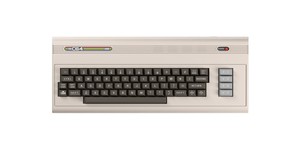Retro Computers unveils ZX Spectrum Vega+ hand-held
February 16, 2016 | 11:25
Companies: #retro-computers-limited

Retro Computers, creators of the Sinclair ZX Spectrum Vega gaming system, are back at the crowd-funding teat with a design that offers on-the-go vintage gaming - but still at a steep price.
The origina Sinclair ZX Spectrum Vega was unveiled back in December 2014 by Luton-based start-up Retro Computers Limited. Engineered by Chris Smith, Spectrum fan and author of The ZX Spectrum ULA: How to Design a Microcomputer, the machine promised complete compatibility with Spectrum software but for one limitation: a restricted 'gaming' keyboard which lacked the keys required to play more complex games such as space-faring classic Elite or text adventure The Hobbit. Despite this, a somewhat rough 3D-printed prototype, and a sky-high £100 price, the company finished its month-long crowd-funding programme at 150 per cent of its original goal.
Post-launch, love for the Vega was in short supply. While the device does indeed work as advertised, reviews were quick to point to its poor build quality, the lack of fidelity available from the composite video output, and the fact that it's possible to buy a genuine ZX Spectrum second-hand for less than its simpler recreation. Despite this, Retro Computers is having a second crack of the whip with a design it has dubbed the ZX Spectrum Vega+.
Using the same internals as its predecessor, the Vega+ is a self-contained hand-held Spectrum. A central colour LCD screen provides the main interface, though a composite TV connection is still available, while a digital direction pad and four-button layout are located to the left and right respectively. Additional control buttons are also provided - though still no full keyboard - as is a micro-SD card slot from which tape or disk files can be loaded to supplement the in-built library of games.
Interestingly, the company appears to be aware that it priced the original Vega too high: while the Vega+ includes far more hardware, it is priced at the same £100 - still an expensive device, given that it's possible to emulate the Z80-based Spectrum on an Android tablet costing as little as £30, with the added bonus of support for thousands of Android applications and other emulators besides.
The company's Indiegogo campaign - run under the site's controversial flexible funding model, where backers' money is taken even if the full funding goal is not met - has at the time of writing raised just over £25,000 of its £100,000 goal from 254 backers with a month remaining on the clock, despite all images being renders rather than photographs of actual hardware.
The origina Sinclair ZX Spectrum Vega was unveiled back in December 2014 by Luton-based start-up Retro Computers Limited. Engineered by Chris Smith, Spectrum fan and author of The ZX Spectrum ULA: How to Design a Microcomputer, the machine promised complete compatibility with Spectrum software but for one limitation: a restricted 'gaming' keyboard which lacked the keys required to play more complex games such as space-faring classic Elite or text adventure The Hobbit. Despite this, a somewhat rough 3D-printed prototype, and a sky-high £100 price, the company finished its month-long crowd-funding programme at 150 per cent of its original goal.
Post-launch, love for the Vega was in short supply. While the device does indeed work as advertised, reviews were quick to point to its poor build quality, the lack of fidelity available from the composite video output, and the fact that it's possible to buy a genuine ZX Spectrum second-hand for less than its simpler recreation. Despite this, Retro Computers is having a second crack of the whip with a design it has dubbed the ZX Spectrum Vega+.
Using the same internals as its predecessor, the Vega+ is a self-contained hand-held Spectrum. A central colour LCD screen provides the main interface, though a composite TV connection is still available, while a digital direction pad and four-button layout are located to the left and right respectively. Additional control buttons are also provided - though still no full keyboard - as is a micro-SD card slot from which tape or disk files can be loaded to supplement the in-built library of games.
Interestingly, the company appears to be aware that it priced the original Vega too high: while the Vega+ includes far more hardware, it is priced at the same £100 - still an expensive device, given that it's possible to emulate the Z80-based Spectrum on an Android tablet costing as little as £30, with the added bonus of support for thousands of Android applications and other emulators besides.
The company's Indiegogo campaign - run under the site's controversial flexible funding model, where backers' money is taken even if the full funding goal is not met - has at the time of writing raised just over £25,000 of its £100,000 goal from 254 backers with a month remaining on the clock, despite all images being renders rather than photographs of actual hardware.

MSI MPG Velox 100R Chassis Review
October 14 2021 | 15:04








Want to comment? Please log in.